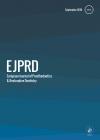European Journal of Prosthodontics and Restorative Dentistry

- Cover Date:
- September 2016
- Print ISSN:
- 0965-7452
- Electronic ISSN:
- 2396-8893
- Vol:
- 24
- Issue:
- 3
Anti-Inflammatory and Regenerative Effects of Albanian Propolis in Experimental Vital Amputations
ABSTRACT
This study evaluated the effects of Albanian propolis on the inflamed pulpal tissue after pulpotomy in piglets. In five piglets, two teeth each were infected using special pathogenic microbial flora that was prepared in advance in order to cause inflammation of the pulp. Pulpotomy was performed in the maxillary and mandibular central and lateral incisors. Microbial flora pathogenesis prepared from the section of infected teeth, containing Staphylococcus aureus, Streptococcus viridans, Enterococcus faecalis, Staphylococcus albus and mixed flora were used to cause artificial pulpitis. The first group consisted of piglets with the teeth having pulpal inflammation and regeneration without medication served as the control group. In the second group, the teeth were treated with pure propolis after vital amputation. In the 3rd, 4th and 5th groups, the teeth were treated after vital amputation with the compounds of ZnO+10%, ZnO+20% propolis in ethanol, and with the paste composed of Ca(OH)2+30% oily propolis, respectively. In half of the teeth, propolis based pastes were applied on the pulp and entries of the cavities were isolated with glass ionomer cement while the other half did not receive this treatment and acted as the control. The cavity entries were obturated with chemically polymerized resin composite. Inflammatory response, dominated by polymorphonuclear
cells, was observed in the dental pulpal tissue of all the teeth that were not treated with propolis-based paste. Radiography and histopathology analyses were performed to survey the infected pulp tissue treated with propolis up to 3 months. Data were analysed using Mann-Whitney U test (α=0.05). After vital amputation of the pulp, application of
Albanian propolis showed significantly higher anti-inflammatory and regenerative effect creating dentin barrier after 3 months of treatment compared to control group (p<0.05). These results were more expressed in the group containing 20% propolis in ethanol+ZnO.
Keywords
Amputation
Dentine bridge
Inflammation
Propolis
Regeneration
doi: 10.1922/EJPRD_1492Meto07
- Article Price
- £15.00
- Institution Article Price
- £
- Page Start
- 145
- Page End
- 151
- Authors
- Aida Meto, Agron Meto, Bora Bimbari, Kastriot Shytaj, Mutlu Özcan
Articles from this issue
- Title
- Pg. Start
- Pg. End
- ‘Own-Label’ Versus Branded Commercial Dental Resin Composite Materials: Mechanical And Physical Property Comparisons
- 122
- 129
- Marginal Adaptation, Gap Width, and Fracture Strength of Teeth Restored With Different All-Ceramic Vs Metal Ceramic Crown Systems: An in Vitro Study
- 130
- 137
- Anti-Inflammatory and Regenerative Effects of Albanian Propolis in Experimental Vital Amputations
- 145
- 151
- Fracture of Zirconia Abutment with Metallic Insertion on Anterior Single Titanium Implant with Internal Hexagon: Retrieval Analysis of a Failure
- 164
- 168
